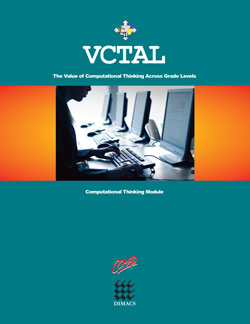September 2018
DIMACS is pleased to announce an award from the National Science Foundation (NSF) for a far-reaching project on professional development for high school teachers. The project is a partnership between DIMACS and the University of Connecticut Neag School of Education, led by DIMACS Associate Director for Education Midge Cozzens, and involving educators from around the country in design and delivery of online professional development (PD) materials. In describing the project, Cozzens notes, “This project is breaking new ground for DIMACS in two important areas—the project is our first on professional development for teachers and also our first based primarily on online delivery. Online delivery is important for its flexibility to allow teachers to weave professional development into their already-packed schedules. It also provides a scalable way to offer PD to teachers across the country." 
The project entitled Teacher Professional Development for Embedding Computational Thinking in Mathematics and Science High School Classes—or PDCT-MS for short—aims to design and test materials that engage high school teachers from a variety of science and mathematics disciplines to bring computational thinking (CT) into their classrooms. The materials will be delivered largely online, but online use is preceded by short in-person workshops. The workshops are a critical bridge that serve to introduce teachers to CT, the online platform, and to each other.
PDCT-MS is an ambitious three-year project consisting of three primary areas of activity: 1) design and development of materials for the PD course; 2) delivering materials to teachers around the country though in-person workshops followed by the on-line course; 3) research testing the efficacy of the professional development delivered. The learning research portion of the project is led by Suzanne Wilson, a professor of Curriculum and Instruction at the University of Connecticut, in collaboration with her colleague Bianca Montrosse-Moorhead, an associate professor of Research Methods, Measurement, and Evaluation. Wilson says, “Project research will contribute to the general understanding of professional development in computational thinking and its effects on CT learning by both teachers and their students. It will also illuminate how existing PD design principles and theories of teacher learning can be invoked to help support teachers in successfully integrating CT into their math and science classrooms.”
Data for the research conducted by Wilson, Montrosse-Moorhead, and their colleagues will be collected during trials with groups of teachers who receive professional development using the newly minted materials in four different geographic locations. Three of these locations (near Boston MA, Albany NY, and Helena MT) will involve three groups of 25 teachers—two of these groups will receive professional development to assist them in integrating computational thinking concepts into their classrooms, while the third group at each location serves as a “control” and receives no PD. For the two groups that receive PD, it will be delivered in each of two different ways. One group will complete the PD over a four-week span during the summer, while the other group will complete the same online course over an eight-week period during the school year. Wilson and her team will collect data through teacher interaction with the online platform, as well as direct observation, interviews, and surveys of teachers and their students. Analyses of these data will help us understand how teachers gain content knowledge and pedagogical skills in CT.
These trials will take place during the second and third years of the project. The first year will be devoted to preparing for the research, creating the PD course materials, and pilot testing with a mixed group of pre-service and in-service teachers at the fourth location in Missouri. In preparation for the full research study in the second and third years of the project, Wilson and her team will spend the first year working with materials developers and the pilot test group to develop surveys, metrics, and other tools for collecting data at the other sites.
The materials for the professional development course will draw on a previous DIMACS project—The Value of Computational Thinking across Grade Levels (VCTAL)—that developed a set of twelve modules for integrating computational thinking into high school classrooms. Each VCTAL module introduces concepts in computational thinking by applying them in contexts that are meaningful and relevant to students. The modules were specifically designed for use in a variety of courses at a variety of grade levels and assume no prior knowledge of computing. PDCT-MS will adapt concepts in the VCTAL modules and other computational thinking resources for use its on-line PD course.
Computing is central to nearly every aspect of our daily lives, but CT ideas are rarely integrated into mathematics and science courses. This is something that targeted PD for teachers can help change this group of teachers was open to the idea. The seeds for the PDCT-MS project trace to the beginning of the VCTAL project when (in 2012) project leaders spoke at a colloquium for 50-60 in-service and pre-service mathematics teachers about DIMACS classroom materials. At the start of the discussion on CT and related VCTAL materials, the speakers asked the audience how many could imagine someday teaching CT in their own classrooms. Only a few raised their hands, but when asked the same question following the discussion, nearly everyone did. It seemed clear that this group of teachers was open to including CT once it was connected to more traditional topics. More recently (in 2017), Cozzens taught a short course on CT for Math for America middle and high school STEM teachers, which brought the need for PD in CT into even sharper focus. Again she found teachers open to CT, but they were in need of some CT background and the “hooks” to include it in existing courses. PDCT-MS aims to provide such background and hooks.
Printable version of this story: [PDF]


